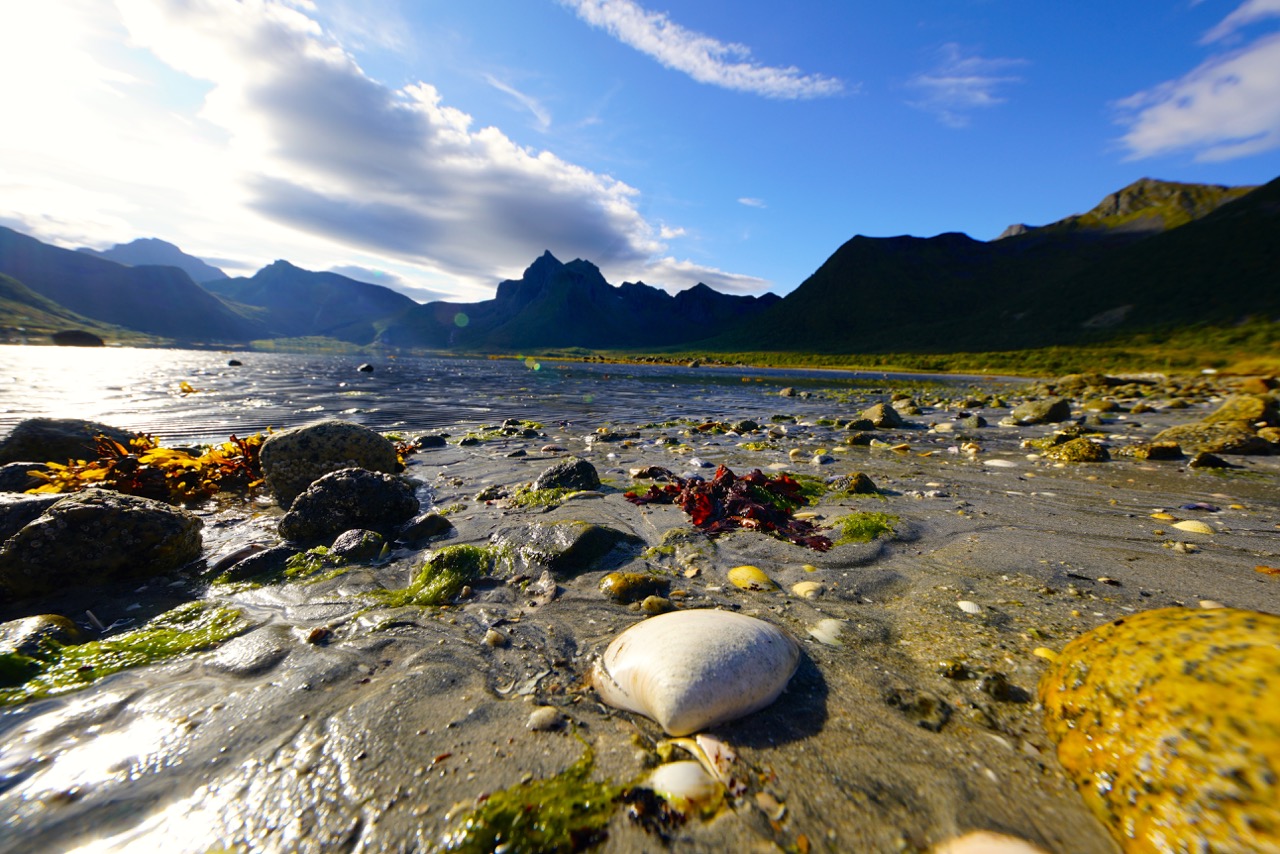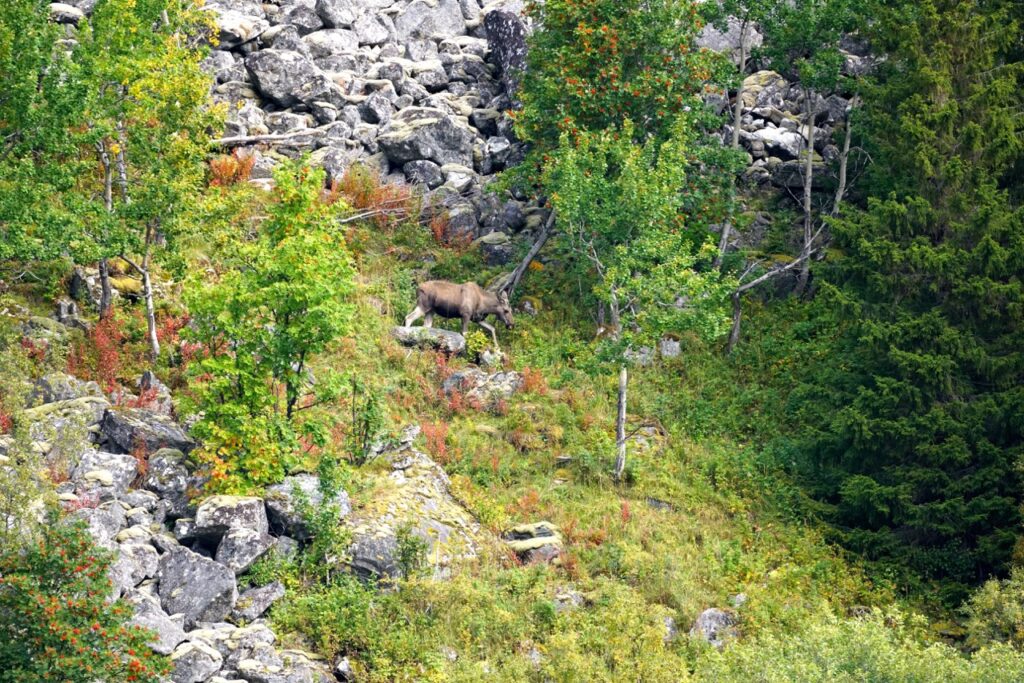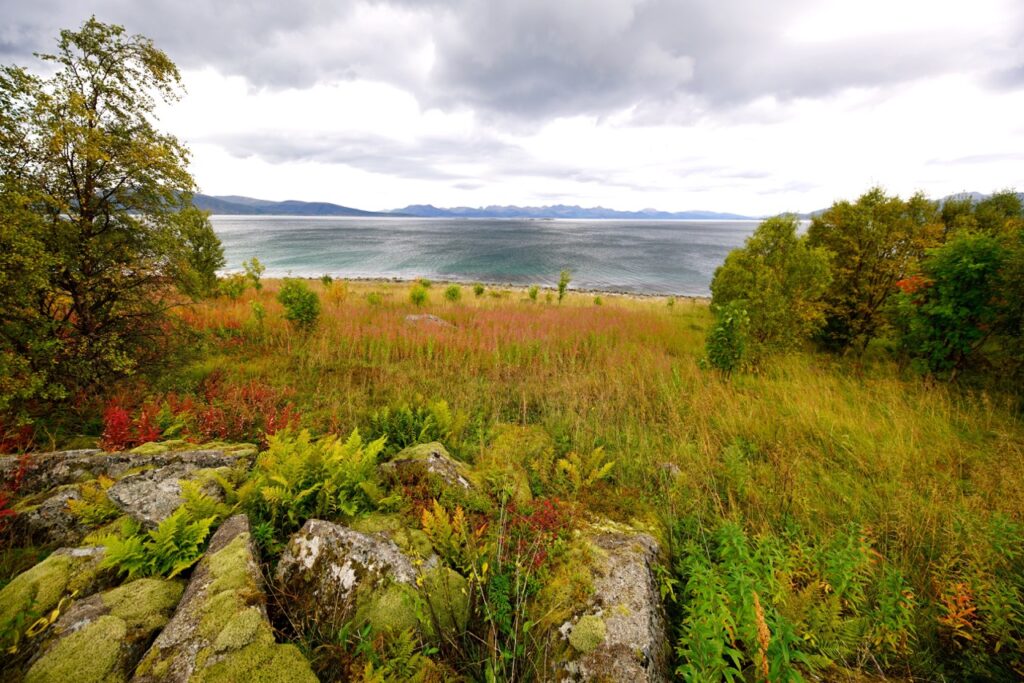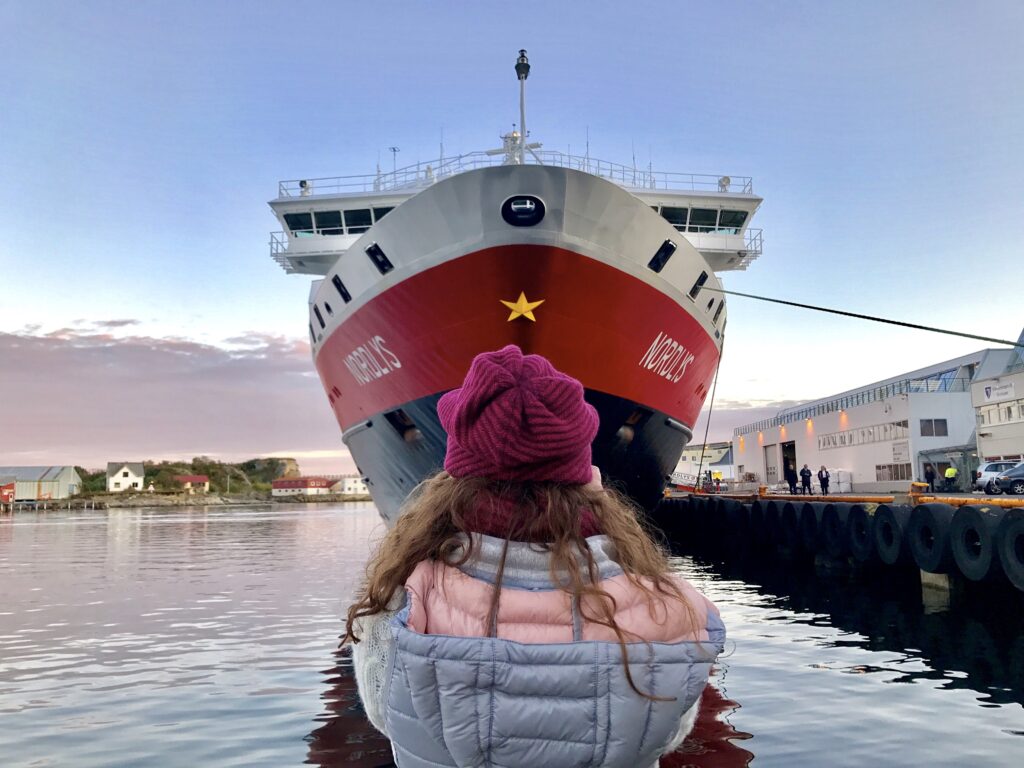I feel unwell by trying to subsume terms like virginity or nativeness into words. Only the name subsume causes me shivers, presses and confines the whole dimension of immensity. A paradox, subsume and immensity! Being here to enjoy the spaciousness of raw and pure nature, in all facets and elements, sparks off the fire of genuine excitement within me.

My amazement spreads unimpeded and moves like the morning fog over the rugged but also mellow landscape while the ocean breeze builds up a salty crystal layer on my dried out skin. Deep-rooted and needy for experiencing the moment transforms misery and sorrow into unity. Its places like that where the death of desires nears definitiveness through fulfillment! Where pain and joy dances in a resonance of tenacity, where the observer disappears, where substance gets significance and where life reduces itself to the final moment.

Lofoten, Northwest Norway…, what an abundance of beauty, spiked to the extent by forces of nature which claim their respect. Ragged and spread are the islands as if god seasoned the ocean with it!
We travel to experience and explore new things, and sometimes we look in the mirror, estranged from itself. So do not be surprised if this post about Lofoten and Vesterålen is less of ‘regular’ blog post and more a personal story, a compelling visual saga about the beauty of the country and life itself. On the move with me on this sweeping trip was Christiane, best travel mate ever! Each journey lives behind certain impressions which rise and sink, like the tides. To put things we have seen, felt or listened to into words is one way to share experiences – but not this time! In this case, I’d like to let the pictures tell (most of the stories) for themselves.
Only the phonetic sound of the names Norway or Lofoten unleashed my exploration and discovery instincts for this rich historical northern land. Pictures from those (partly remote) regions moved me from the beginning and now, fall 2017 it was finally my time to visit! Welcome to Lofoten and Vesterålen in Norway. Lofoten was the original name of the island Vestvågøya. The first element is ló (i.e., “lynx”) and the last part is derived from Norse fótr (i.e., “foot”), as the shape of the island must have been compared with that of a lynx’s foot. To tour the Lofoten was a very emotional journey right from the beginning, surprising and easily disturbing.

Whensoever I sling my legs around the words it usually worked out, but this time it doesn’t seem to be enough. Latitude and longitude serve as references, supplying us with hints and clues but are never able to deliver the whole taste of this mesmerizing landscapes. Everything from the outside, all I perceived and each emotion sank deep into the inner core of the cells. I did not have any tools to handle this sustained amazement which was responsible for the overall resonance. I felt open, vulnerable, exposed, blank but anyhow connected. Ready for the journey we cruised, blessed by the weather and the unpredictability of the next moment.

https://www.youtube.com/watch?v=eOy4e1t8mJU
For everyone who is intending to visit Lofoten, here comes the first hint: Dig up your treasury of adjective words and do not forget to find descriptions for all kinds of RED, you will need it! I feel dizzy because of the abundance in general, the spectrum of light and the vibrant colors. Having a camera around my neck never felt more unnecessary in which direction I looked I was surrounded by a natural unsurpassable installation of nature. No arrangement could ever compete in comparison to this composition of diversity which was omnipresent in its presence. The challenge for photographers is not to find motives here at the Lofoten; it is to avoid the majority of it!
The following pics I have taken with the drone between Fiskebøl and Laukvik. Your drone has to be ready at any time for take-off because the weather conditions can change rapidly and most of the time there is just too much wind for a safe flight.


I love the idea of coincidence, the unknown mystery of how and why I encounter things and people. Personalities like Rolf, a down-to-earth Norwegian, a cattle farmer and a very warm and heartfelt person. His Airbnb accommodation, a wooden house near Fiskebøl, offers every needed comfort (in such environment) including a great fireplace.

For all of you, who HAVE NOT looked up till now, on how you get to the Lofoten, here is another hint or recommendation. The easiest way is by flying to OSLO and then change to an onward domestic flight to either EVENES or SVOLVAER. At both places it is possible to rent cars in various deliberations, just make sure to book in advance (especially in summertime). We just choose to drive the main road, the E10, if there was no alternative route to it. Most of the time you can find smaller roads to cruise along, which makes way more fun regarding explorations. Our rented Skoda 4 x 4 had the additional asset…. because we could sleep in it (after moving all our stuff out of the way). But route 888 which starts at Fiskebøl had some more pleasant surprises for us. Rolf mentioned Rolf’s Bar, a small cabin which he offers the community to use and something about a wooden shelter for cyclists. Hm…, what a surprise!

There are no signs but we found both the place anyway and for those of you who use GPS, here are the coordinates: 68.421272,14.567374. We were blown away by the generosity on one side and the convenient architectural surprise on the other. The shelter was a great place for a night, especially with Rolf’s Bar next to, which had a fireplace. We cooked inside the older cabin and laid down on our mattresses and sleeping bags in the newer, stylish ‘shelter.’
https://www.youtube.com/watch?v=l8u_dbF3n-Q
What a place and blessing, a great location to enjoy the spaciousness and to observe northern lights. Pure beauty and by that, I am not just narrowing down or pointing the words towards the architectural object, no… I mean the whole environmental surrounding.

With each step, I subsided deeper and deeper into the colorful moss which overspreads the whole area. Ferns, lichens and old industrial artifacts which were left behind, at the time when the individual fishing industry had a sudden drop, can still be found in this specific and other regions of the Lofoten. Mother Nature did not put aside here anything; you will find exactly the opposite here! An abundance of beauty, so it is no surprise (surrounded by sea but blessed with fresh water) if you see or encounter eagles and elk in this biosphere.


Till the early eighties, most villages were just reached by boat. The progress of building roads in this rugged regions was slow, so some communities, like Henningsvær, got its first road access in 1983! Fishing was over centuries the main and only income, essential for survival.
It is undoubtedly not far from Evenes Airport to Å i Lofoten, around 300 km (from east to west) but we realized on the fourth day that we only drove about 80 km since we arrived. What a great sign for this diverse region and the (weather) gods were more than merciful with us because we had thirteen incredible sunny, warm days (out of fourteen)! The sunlight was refreshing our souls while the different light reflections were responsible for our perpetual astonishment. There it was, a real classical picture of us with a hot cup of coffee in our hands while we looked up to steep, towering mountains and next to it the calm ocean. After we tuck everything in the back of the car we were cruising slowly towards Laukvik. Road 888 which is purled by beauties of nature runs along deep Fjordland, passing white beaches and always accompanied by vast changing landscapes, caused by the strong tides. A perfect place to take off…
https://www.youtube.com/watch?v=GKcyi5OuOcs&t=14s

The small villages of Laukvik snuggles in at the harsh north coast of Lofoten, a protected bay for the fishing people and fishing was and still is (besides tourism) the driving force in most regions.

The most fertile codfish catch in the world is taking place every winter at Lofoten. Since almost 1000 years codfish was and is distributed all over Europe. Codfish is just getting cleaned after the catch but does not need any preservatives like smoking or to be cured before it is placed on the wooden frameworks for several months. Trading with codfish started as early as the 12th century between the Lofoten and Europe. While 100 years ago around 30000 fishermen were involved in the Lofoten fishery, today’s number with about 2000 fishermen insecure everybody. A lot of times the fisherman used basic huts close to shore, the so-called Rorbu. Meanwhile, most of the fishermen are staying on their boats, so the traditional houses are used for tourists. The word Rorbu combines the words ‘Ro’ (row) and ‘bu’ (living).
I am looking into the driving mirror while the colors of the houses got swallowed by the sunset and the only recognizable things left, are the contours of villages, shimmering as a fading silhouette. We are moving away from route 888 till we meet with the E10, the main road to Svolvær, the most prominent city of Lofoten (with around 5000 people).

Lofoten part I, September 2017
Making coffee and taking pictures, two of the most favorite activities of Christiane & myself.
























































